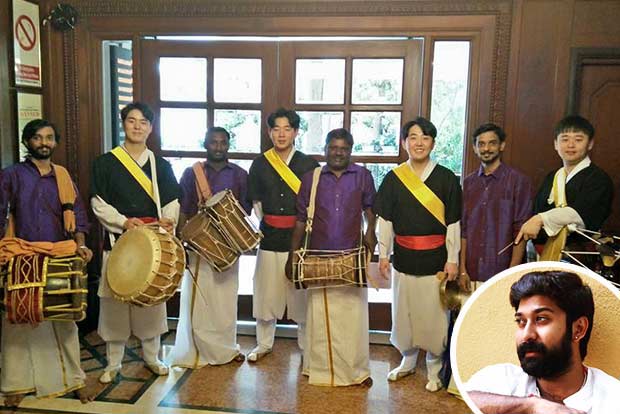Begin typing your search...
'Thappattam is more than saavu kutthu'
Teachers and youngsters alike are trying to create awareness about the positive effects of reviving and sustaining native dances and music of Tamil Nadu

Chennai
Probably one of the most revered folk art forms, Thappattam is so full of energy and positivity that it can make anyone dance along.
Yet, it has been tainted as saavu melam (music played during funeral processions in southern India) and is looked down upon by many in the big cities. These individuals are taking baby steps towards changing this notion. In the field of performing arts for 20-odd years, John Milton Fernando is a respected master of Thappattam, based in Chennai. He has a troupe of dancers and they perform at various venues.
“The artistes who perform with me now have stayed with me for many years. When we put up a show, a handful from the audiences are interested and sign up for classes too. However, this is not a sustainable field as we get only one or two shows a month and the pay is as less as Rs. 2,000. How amI supposed to pay ten dancers with this?” he asks.
Instantaneously, he offers a remedy as well for this fix — “Just like how skating rinks have been created in public spaces like beaches and parks, a dedicated place where people like me can train youngsters in folk arts would do a great deal of good.”
He believes it’ll increase exposure and create awareness about the dance form, generate more income for teachers like him as well as preserve the dying culture of koothu performances. MV Vetri started off as an actor for the small screen and in short films but he knew he had a higher purpose.
“I was keen on learning more about rustic dance and music so I began travelling to parts of rural Tamil Nadu. After two and a half years of being on the road, I wanted to bring the knowledge I had gained to Chennai so I helped put together a series of Therukoothu performances,” he says.
While, he shares a little bit of what he learnt during his sojourns, his guru Nellai Manikandan chips in. “Every folk dance began as a ritual in the villages and would be part of various auspicious events like weddings, temple thiruvizhas (fair), etc.,” he explains.
Sadly, foreigners are more aware of it than locals. He illustrates with an example — “I teach in a school here and the Tamil professor once asked me why I was teaching the kids saavu kutthu . I was baffled by his ignorance! At the same time, foreigners at least read about tharai though they don’t perform it.” Since its inception, Thappattam has had more benefits on the body and mind than meets the eyes but people lack awareness about it.
“When we go to schools, colleges and public places to stage these performances, the audience are awed as to how one person can dance, sing and play an instrument at the same time without missing a beat! That’s how powerful Thappattam is — it improves mind-body coordination, is a natural method of weight loss and is great for stress management. Ippo dhan Zumba ellam , but they can all be rooted back to our ancient traditions,” Vetri says.
John agrees with him, “Youngsters these days like to imitate the West more than stick to our traditions; well, I have no qualms about this. So I’ve come up with innovative ways to entertain my new students and audiences — I dress up hip-hop dancers in Puli vesham costumes and the crowd are enthralled to see them fly and jump mixed with traditional footwork and beats!” he smiles.
Visit news.dtnext.in to explore our interactive epaper!
Download the DT Next app for more exciting features!
Click here for iOS
Click here for Android
Next Story



